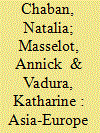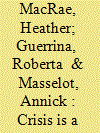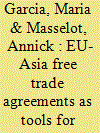|
|
|
Sort Order |
|
|
|
Items / Page
|
|
|
|
|
|
|
| Srl | Item |
| 1 |
ID:
144982


|
|
|
|
|
| Summary/Abstract |
This special issue sets out to explore the responses of norm-receivers to EU export of
norms and values. The main focus of this special issue is on the Asian recipients of EU
norms. The leading theoretical explanations—used by all contributors to this Issue—
are from the revisited analytical framework of ‘Normative Power Europe’ (NPE). NPE
is a popular conceptual paradigm that has informed debate about the EU since the early
2000s. Introduced in the seminal work by Ian Manners (2002), it remains a useful and
intellectually attractive model to understand the EU and its actions both internally and
externally. Its appeal lies in its emphasis on ideas; its open, eclectic and critical nature;
and its focus on explanations of power beyond state-centred models
|
|
|
|
|
|
|
|
|
|
|
|
|
|
|
|
| 2 |
ID:
178026


|
|
|
|
|
| Summary/Abstract |
As critics are quick to point out, the European Union (EU) has entered the crisis phase of its evolution. It could be argued that crisis management is now the EU’s new normal. Dealing with both endogenous (e.g., economic crisis and Brexit) and exogenous crises (e.g., the migrant crisis and COVID-19), the EU is facing a whole new set of challenges that has the potential to destabilize the complex institutional balance that has maintained the process of European integration over the last 70 years. In this environment of rapid responses, gender+ equality has frequently been compromised. As we argue in this article, the implications of this backsliding are grave not only for equality but also for the European Union as a whole. Drawing on Walby’s concept of gender regimes and social transformation, we consider current crises and the EU’s responses to those crises to highlight potentially dangerous shifts in the European gender regime. With crisis response increasingly supporting a neo-liberal gender regime, the current state of perpetual crisis in the European institutions does not bode well for the future of equality.
|
|
|
|
|
|
|
|
|
|
|
|
|
|
|
|
| 3 |
ID:
144983


|
|
|
|
|
| Summary/Abstract |
Article 21 of the Treaty of Lisbon mandates the European Union (EU) to foster its values (democracy, the rule of law, social rights, gender equality, etc.) in its external relations. The core concern of the EU’s multi-faceted relations with Asia is economic relations with rising markets. EU relations with the region have focused on the facilitation of trade and investment through the negotiation of free trade agreements (FTAs) with a number of Asian partners. EU FTAs are accompanied by a Political Cooperation Agreement (PCA), which links core EU values to trade through the ‘standard clause’, whereby under certain circumstances, human rights’ abuses can trigger a suspension of trade preferences. Using a qualitative case study methodology, and drawing on policy documents and interviews, this paper addresses the question of whether, and how, the EU can balance its internal legal obligations with its economic interests and its partners’ demands. The article provides a legal background of the EU’s obligations in terms of international value promotion. It then reviews EU trade policy strategies and reveals an absence of a concerted approach to the inclusion of values. The article investigates the sources of resistance to EU attempts at linking its trade policy with broader values including social rights with Asian partners. The analysis reveals that Asian resistance is centred on the legalistic approach of the EU rather than the values and suggests that a more effective norm export might be achieved through other means. The article concludes that the EU’s failure to push forward social issues in FTAs ultimately casts serious doubts about the EU’s international ‘actorness’ in the area of social rights.
|
|
|
|
|
|
|
|
|
|
|
|
|
|
|
|
|
|
|
|
|